商务英语读书报告book report of International Business Negotiation
- 格式:doc
- 大小:34.00 KB
- 文档页数:6
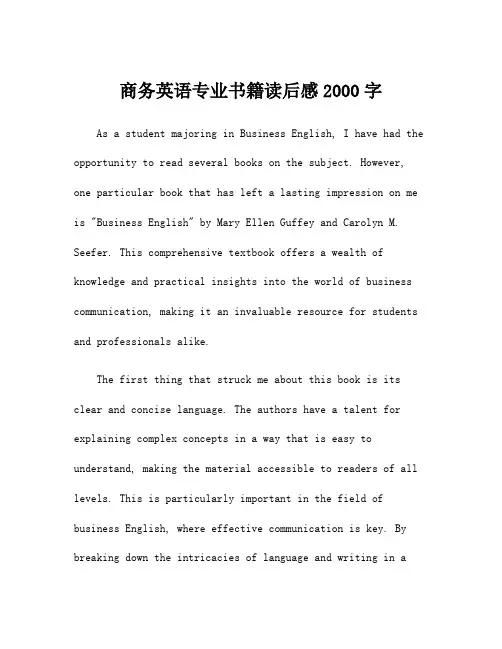
商务英语专业书籍读后感2000字As a student majoring in Business English, I have had the opportunity to read several books on the subject. However, one particular book that has left a lasting impression on me is "Business English" by Mary Ellen Guffey and Carolyn M. Seefer. This comprehensive textbook offers a wealth of knowledge and practical insights into the world of business communication, making it an invaluable resource for students and professionals alike.The first thing that struck me about this book is its clear and concise language. The authors have a talent for explaining complex concepts in a way that is easy to understand, making the material accessible to readers of all levels. This is particularly important in the field of business English, where effective communication is key. By breaking down the intricacies of language and writing in astraightforward manner, Guffey and Seefer have made the subject much less intimidating and more understandable.Another aspect of the book that I found impressive is its emphasis on real-world application. Throughout the chapters, the authors provide numerous examples and case studies that illustrate how the principles of business English can be put into practice. From writing persuasive emails to conducting successful presentations, the book offers practical advice that can be directly applied in a professional setting. This practical approach has helped me to see the relevance of the material and has motivated me to take my studies more seriously.Moreover, "Business English" also covers a wide range of topics, including business writing, speaking, and listening skills. By addressing these various aspects of communication, the book offers a holistic view of the subject and equips readers with a well-rounded skill set. This comprehensiveapproach has been instrumental in broadening my understanding of business English and has given me the confidence to communicate effectively in different contexts.Additionally, the book provides valuable resources for self-assessment and improvement. Each chapter includes exercises and activities that challenge readers to applytheir knowledge and practice their skills. These hands-on learning opportunities have been invaluable in helping me to reinforce what I have learned and to identify areas for further development. The inclusion of self-assessment tools has also encouraged me to take a more active role in my own learning, which I believe is crucial for personal and professional growth.Furthermore, I appreciate the global perspective that the book offers. In today's interconnected world, effective communication is essential not only within one's own culture, but also across cultures. "Business English" recognizes thisreality and provides insights into how to communicate with people from different cultural backgrounds. By discussing topics such as intercultural communication and global business etiquette, the book prepares readers to navigate the complexities of international business communication. As a student with aspirations of working in a global business environment, this aspect of the book has been particularly enlightening and relevant.On a more personal note, reading "Business English" has been an enriching and inspiring experience for me. As someone who is passionate about language and communication, the book has deepened my understanding of how these skills can be effectively applied in the business world. It has also reminded me of the importance of continuous learning andself-improvement. In the fast-paced and constantly evolving field of business, staying abreast of the latest communication trends and techniques is crucial, and "Business English" has served as a valuable guide in this regard.In conclusion, "Business English" by Mary Ellen Guffeyand Carolyn M. Seefer has had a profound impact on me as a student of business English. Its clear language, practical approach, comprehensive coverage, self-assessment resources, and global perspective have made it an indispensable resource for me. I believe that the knowledge and skills I have gained from this book will serve me well in my academic and professional endeavors, and I would highly recommend it to anyone looking to improve their business communication skills.。
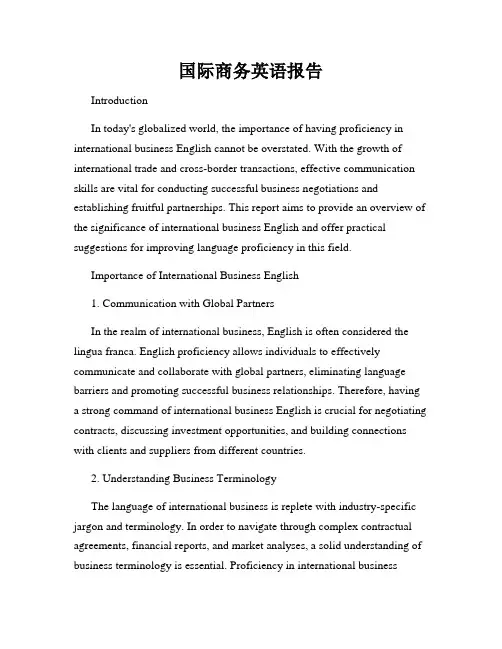
国际商务英语报告IntroductionIn today's globalized world, the importance of having proficiency in international business English cannot be overstated. With the growth of international trade and cross-border transactions, effective communication skills are vital for conducting successful business negotiations and establishing fruitful partnerships. This report aims to provide an overview of the significance of international business English and offer practical suggestions for improving language proficiency in this field.Importance of International Business English1. Communication with Global PartnersIn the realm of international business, English is often considered the lingua franca. English proficiency allows individuals to effectively communicate and collaborate with global partners, eliminating language barriers and promoting successful business relationships. Therefore, having a strong command of international business English is crucial for negotiating contracts, discussing investment opportunities, and building connections with clients and suppliers from different countries.2. Understanding Business TerminologyThe language of international business is replete with industry-specific jargon and terminology. In order to navigate through complex contractual agreements, financial reports, and market analyses, a solid understanding of business terminology is essential. Proficiency in international businessEnglish equips individuals with the ability to grasp and interpret these nuances accurately, ensuring clear and precise communication while minimizing the chances of misunderstandings.3. Enhancing Professionalism and CredibilityFluency in international business English conveys professionalism and credibility. It demonstrates a commitment to effective communication and reflects an individual's dedication to becoming a well-rounded global business professional. Employers often view strong language skills as an asset, as it enables employees to represent the company professionally, engage in persuasive presentations, and negotiate favorable deals, thereby contributing to the overall success of the organization.Strategies for Improving International Business English Skills1. Language Training ProgramsEnrolling in language training programs specifically designed for international business English can significantly enhance language proficiency. These programs offer comprehensive courses that focus on various aspects of business communication, including vocabulary building, writing emails and reports, conducting presentations, and participating in meetings. By attending such programs, individuals can acquire practical skills and familiarize themselves with the specific language requirements of the global business environment.2. Cultural Exchange ProgramsLanguage learning is closely intertwined with culture. Participating in cultural exchange programs or traveling to English-speaking countriesprovides valuable exposure to native English speakers and an immersive language learning environment. Experiencing different cultural norms and practices enables individuals to develop a deeper understanding of international business etiquette, which further enhances communication skills and fosters positive business relationships.3. Engaging in Business English ActivitiesEngaging in business-related activities in English can be an effective way to improve language skills and gain practical experience. This can involve attending conferences, seminars, or workshops conducted in English, joining business-oriented discussion groups, or even taking part in international business simulations. These activities offer opportunities to practice speaking, listening, and writing skills in authentic business contexts, thus honing overall language proficiency.ConclusionIn conclusion, international business English plays a crucial role in the success of global business endeavors. Effective communication skills, coupled with a thorough understanding of business terminology, are essential for conducting negotiations, establishing partnerships, and representing organizations professionally. By prioritizing language training programs, cultural exchange experiences, and engaging in business English activities, individuals can enhance their language proficiency, thereby maximizing their potential for success in the field of international business. It is imperative for professionals in this domain to continually invest in improving their international business English skills to stay competitive in the global market.。
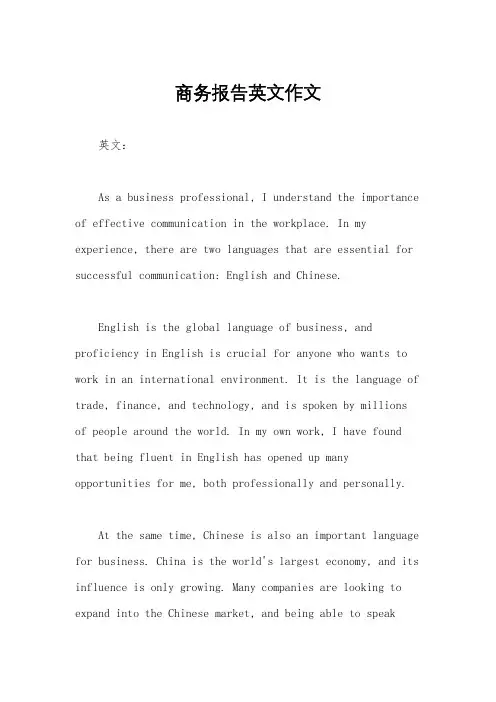
商务报告英文作文英文:As a business professional, I understand the importance of effective communication in the workplace. In my experience, there are two languages that are essential for successful communication: English and Chinese.English is the global language of business, and proficiency in English is crucial for anyone who wants to work in an international environment. It is the language of trade, finance, and technology, and is spoken by millions of people around the world. In my own work, I have found that being fluent in English has opened up many opportunities for me, both professionally and personally.At the same time, Chinese is also an important language for business. China is the world's largest economy, and its influence is only growing. Many companies are looking to expand into the Chinese market, and being able to speakChinese can be a valuable asset. In addition, many Chinese businesspeople prefer to communicate in their own language, and being able to speak Chinese can help to build trust and establish strong relationships.中文:作为一名商务专业人士,我知道在工作中有效地沟通的重要性。
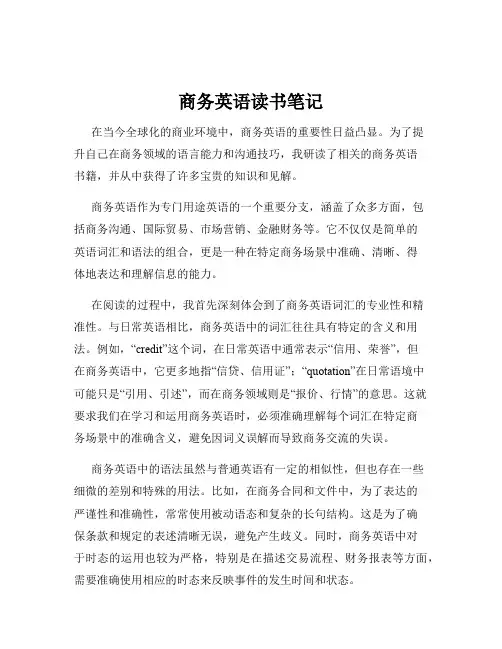
商务英语读书笔记在当今全球化的商业环境中,商务英语的重要性日益凸显。
为了提升自己在商务领域的语言能力和沟通技巧,我研读了相关的商务英语书籍,并从中获得了许多宝贵的知识和见解。
商务英语作为专门用途英语的一个重要分支,涵盖了众多方面,包括商务沟通、国际贸易、市场营销、金融财务等。
它不仅仅是简单的英语词汇和语法的组合,更是一种在特定商务场景中准确、清晰、得体地表达和理解信息的能力。
在阅读的过程中,我首先深刻体会到了商务英语词汇的专业性和精准性。
与日常英语相比,商务英语中的词汇往往具有特定的含义和用法。
例如,“credit”这个词,在日常英语中通常表示“信用、荣誉”,但在商务英语中,它更多地指“信贷、信用证”;“quotation”在日常语境中可能只是“引用、引述”,而在商务领域则是“报价、行情”的意思。
这就要求我们在学习和运用商务英语时,必须准确理解每个词汇在特定商务场景中的准确含义,避免因词义误解而导致商务交流的失误。
商务英语中的语法虽然与普通英语有一定的相似性,但也存在一些细微的差别和特殊的用法。
比如,在商务合同和文件中,为了表达的严谨性和准确性,常常使用被动语态和复杂的长句结构。
这是为了确保条款和规定的表述清晰无误,避免产生歧义。
同时,商务英语中对于时态的运用也较为严格,特别是在描述交易流程、财务报表等方面,需要准确使用相应的时态来反映事件的发生时间和状态。
商务沟通是商务英语的核心内容之一。
良好的商务沟通不仅需要准确的语言表达,还需要考虑到文化差异、沟通对象的背景和需求等因素。
在跨文化商务交流中,了解不同国家和地区的商务礼仪和文化习惯至关重要。
例如,在某些国家,直接拒绝对方的提议可能被视为不礼貌,而需要采用更加委婉、含蓄的方式来表达自己的观点。
此外,非语言沟通,如肢体语言、面部表情等,在商务交流中也能传递重要的信息,需要我们加以关注和理解。
国际贸易是商务英语应用的一个重要领域。
在国际贸易中,各种单证和文件的处理都需要用到专业的商务英语。
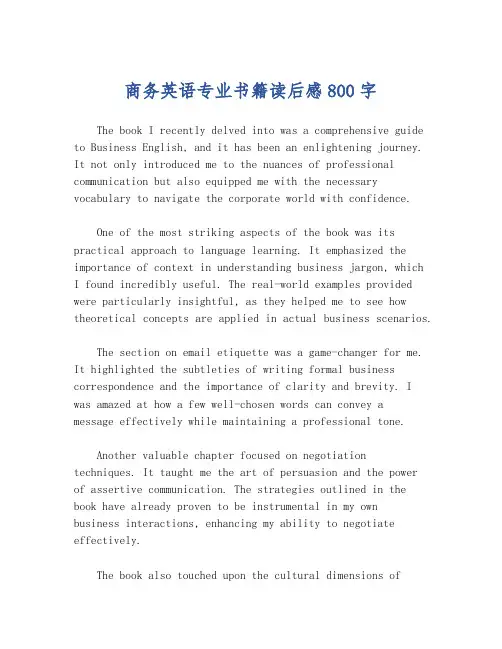
商务英语专业书籍读后感800字The book I recently delved into was a comprehensive guide to Business English, and it has been an enlightening journey. It not only introduced me to the nuances of professional communication but also equipped me with the necessary vocabulary to navigate the corporate world with confidence.One of the most striking aspects of the book was its practical approach to language learning. It emphasized the importance of context in understanding business jargon, which I found incredibly useful. The real-world examples provided were particularly insightful, as they helped me to see how theoretical concepts are applied in actual business scenarios.The section on email etiquette was a game-changer for me. It highlighted the subtleties of writing formal business correspondence and the importance of clarity and brevity. I was amazed at how a few well-chosen words can convey a message effectively while maintaining a professional tone.Another valuable chapter focused on negotiation techniques. It taught me the art of persuasion and the powerof assertive communication. The strategies outlined in the book have already proven to be instrumental in my ownbusiness interactions, enhancing my ability to negotiate effectively.The book also touched upon the cultural dimensions ofbusiness communication, which was an eye-opener. Understanding the cultural context of international business partners is crucial, and the book provided a solid foundation for recognizing and respecting these differences.One of the chapters that stood out was on presentation skills. It offered a step-by-step guide on crafting and delivering compelling presentations. The tips on body language and voice modulation were particularly helpful in polishing my public speaking skills.Moreover, the book's discussion on the role of social media in business was timely and relevant. It provided a balanced view of the opportunities and challenges that social platforms present, guiding readers on how to leverage themfor professional growth.The final chapter on cross-cultural communication was a testament to the book's comprehensive nature. It delved into the complexities of global business and the need for sensitivity and adaptability when dealing with diverse teams and markets.In conclusion, this book has been an invaluable resource in my pursuit of mastering Business English. It has not only expanded my linguistic repertoire but also deepened my understanding of the intricate world of business communication. I would highly recommend it to anyone looking to excel in the professional arena.。
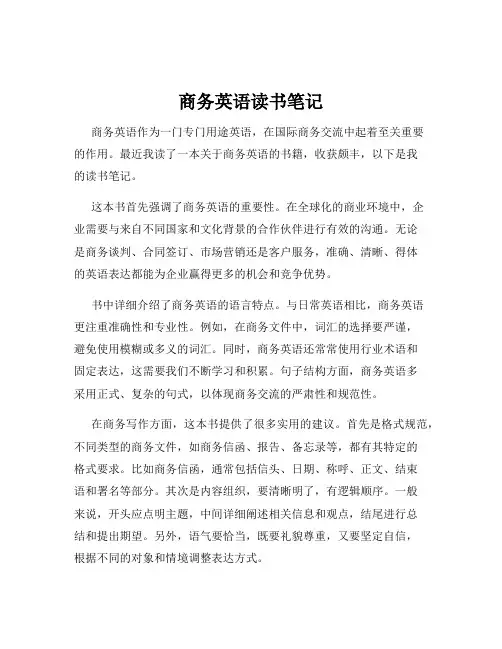
商务英语读书笔记商务英语作为一门专门用途英语,在国际商务交流中起着至关重要的作用。
最近我读了一本关于商务英语的书籍,收获颇丰,以下是我的读书笔记。
这本书首先强调了商务英语的重要性。
在全球化的商业环境中,企业需要与来自不同国家和文化背景的合作伙伴进行有效的沟通。
无论是商务谈判、合同签订、市场营销还是客户服务,准确、清晰、得体的英语表达都能为企业赢得更多的机会和竞争优势。
书中详细介绍了商务英语的语言特点。
与日常英语相比,商务英语更注重准确性和专业性。
例如,在商务文件中,词汇的选择要严谨,避免使用模糊或多义的词汇。
同时,商务英语还常常使用行业术语和固定表达,这需要我们不断学习和积累。
句子结构方面,商务英语多采用正式、复杂的句式,以体现商务交流的严肃性和规范性。
在商务写作方面,这本书提供了很多实用的建议。
首先是格式规范,不同类型的商务文件,如商务信函、报告、备忘录等,都有其特定的格式要求。
比如商务信函,通常包括信头、日期、称呼、正文、结束语和署名等部分。
其次是内容组织,要清晰明了,有逻辑顺序。
一般来说,开头应点明主题,中间详细阐述相关信息和观点,结尾进行总结和提出期望。
另外,语气要恰当,既要礼貌尊重,又要坚定自信,根据不同的对象和情境调整表达方式。
商务英语中的听力和口语技能也不容忽视。
在国际商务会议、电话沟通和商务洽谈中,良好的听力理解能力能帮助我们准确获取信息,避免误解。
而流利、准确的口语表达则能让我们有效地传达自己的想法和观点,增强与对方的合作意愿。
为了提高这两项技能,我们可以多听商务英语的相关材料,如商务新闻、讲座等,并进行模仿和练习。
商务英语中的跨文化交际也是一个重要的内容。
不同国家和地区有着不同的商业文化和习惯,了解并尊重这些差异对于成功的商务交流至关重要。
例如,在某些国家,直接表达拒绝可能被视为不礼貌,而需要采用更委婉的方式。
在与不同文化背景的人交流时,要注意语言和非语言的沟通方式,避免因文化误解而导致商务合作的失败。
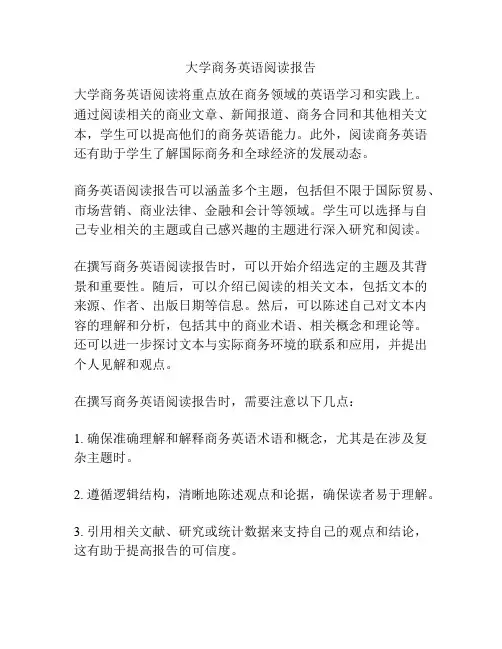
大学商务英语阅读报告
大学商务英语阅读将重点放在商务领域的英语学习和实践上。
通过阅读相关的商业文章、新闻报道、商务合同和其他相关文本,学生可以提高他们的商务英语能力。
此外,阅读商务英语还有助于学生了解国际商务和全球经济的发展动态。
商务英语阅读报告可以涵盖多个主题,包括但不限于国际贸易、市场营销、商业法律、金融和会计等领域。
学生可以选择与自己专业相关的主题或自己感兴趣的主题进行深入研究和阅读。
在撰写商务英语阅读报告时,可以开始介绍选定的主题及其背景和重要性。
随后,可以介绍已阅读的相关文本,包括文本的来源、作者、出版日期等信息。
然后,可以陈述自己对文本内容的理解和分析,包括其中的商业术语、相关概念和理论等。
还可以进一步探讨文本与实际商务环境的联系和应用,并提出个人见解和观点。
在撰写商务英语阅读报告时,需要注意以下几点:
1. 确保准确理解和解释商务英语术语和概念,尤其是在涉及复杂主题时。
2. 遵循逻辑结构,清晰地陈述观点和论据,确保读者易于理解。
3. 引用相关文献、研究或统计数据来支持自己的观点和结论,这有助于提高报告的可信度。
4. 关注商务英语阅读报告中的语法和拼写错误,并进行校对和编辑。
最后,在商务英语阅读报告的结尾,可以再次总结主要观点和学到的知识,并提供对进一步研究和学习的建议。
一篇好的商务英语阅读报告不仅要展示对相关文本的理解和分析,还要表达自己的思考和见解,以展示自己在商务英语领域的学习和发展。
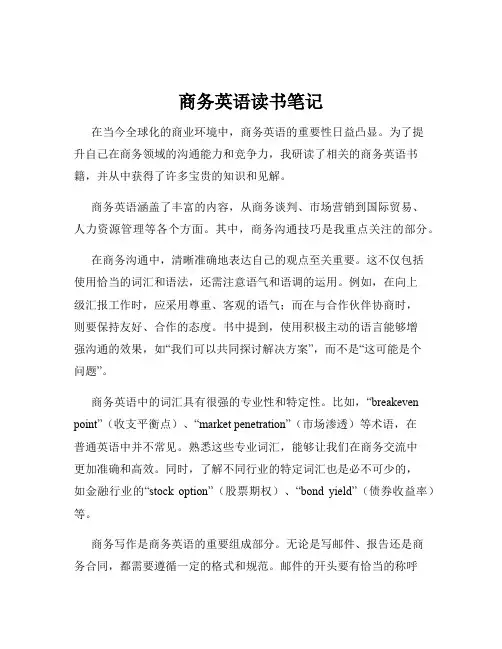
商务英语读书笔记在当今全球化的商业环境中,商务英语的重要性日益凸显。
为了提升自己在商务领域的沟通能力和竞争力,我研读了相关的商务英语书籍,并从中获得了许多宝贵的知识和见解。
商务英语涵盖了丰富的内容,从商务谈判、市场营销到国际贸易、人力资源管理等各个方面。
其中,商务沟通技巧是我重点关注的部分。
在商务沟通中,清晰准确地表达自己的观点至关重要。
这不仅包括使用恰当的词汇和语法,还需注意语气和语调的运用。
例如,在向上级汇报工作时,应采用尊重、客观的语气;而在与合作伙伴协商时,则要保持友好、合作的态度。
书中提到,使用积极主动的语言能够增强沟通的效果,如“我们可以共同探讨解决方案”,而不是“这可能是个问题”。
商务英语中的词汇具有很强的专业性和特定性。
比如,“breakeven point”(收支平衡点)、“market penetration”(市场渗透)等术语,在普通英语中并不常见。
熟悉这些专业词汇,能够让我们在商务交流中更加准确和高效。
同时,了解不同行业的特定词汇也是必不可少的,如金融行业的“stock option”(股票期权)、“bond yield”(债券收益率)等。
商务写作是商务英语的重要组成部分。
无论是写邮件、报告还是商务合同,都需要遵循一定的格式和规范。
邮件的开头要有恰当的称呼和问候语,主体内容要简洁明了,重点突出。
报告则要结构清晰,包含引言、正文、结论等部分。
商务合同的语言更是要严谨、精确,避免产生歧义。
在商务谈判方面,书中介绍了许多实用的策略和技巧。
了解对方的需求和利益是成功谈判的关键。
通过有效的倾听和提问,我们可以更好地把握对方的立场。
同时,掌握一些谈判的话术,如“这已经是我们能提供的最优条件了”、“如果您能接受这个价格,我们可以在其他方面给予一定的优惠”等,能够帮助我们在谈判中占据主动。
商务英语中的跨文化交际也是一个不容忽视的问题。
不同国家和地区有着不同的商业文化和习惯。
比如,在一些国家,直接拒绝对方可能被视为不礼貌,而需要采用委婉的方式表达否定意见。
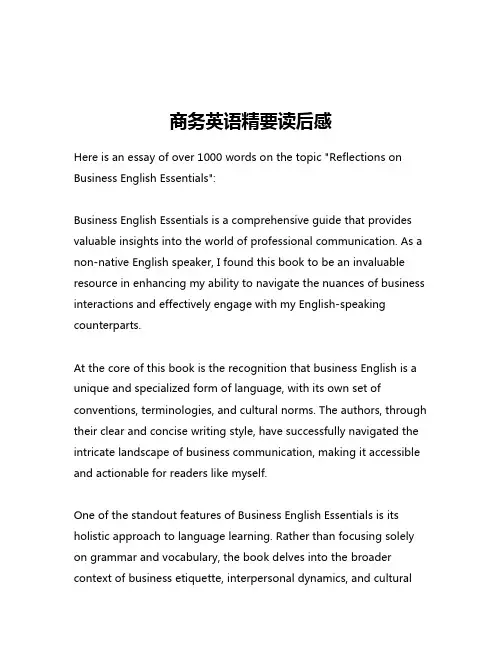
商务英语精要读后感Here is an essay of over 1000 words on the topic "Reflections on Business English Essentials":Business English Essentials is a comprehensive guide that provides valuable insights into the world of professional communication. As a non-native English speaker, I found this book to be an invaluable resource in enhancing my ability to navigate the nuances of business interactions and effectively engage with my English-speaking counterparts.At the core of this book is the recognition that business English is a unique and specialized form of language, with its own set of conventions, terminologies, and cultural norms. The authors, through their clear and concise writing style, have successfully navigated the intricate landscape of business communication, making it accessible and actionable for readers like myself.One of the standout features of Business English Essentials is its holistic approach to language learning. Rather than focusing solely on grammar and vocabulary, the book delves into the broader context of business etiquette, interpersonal dynamics, and culturalsensitivity. This breadth of coverage is particularly valuable, as it underscores the importance of understanding the nuances of professional interactions, beyond the mere mechanics of the language.The chapter on business correspondence, for instance, provides a comprehensive guide to crafting effective emails, letters, and other written communications. The authors emphasize the importance of clarity, concision, and tone, highlighting the subtle differences between formal and informal styles, and the impact they can have on the recipient's perception. This knowledge has been instrumental in shaping my own writing style, ensuring that my professional communications are polished, persuasive, and tailored to the specific context.Another key strength of the book is its focus on interpersonal skills, a crucial aspect of business success that is often overlooked in language learning materials. The chapter on effective meetings, for example, delves into the dynamics of group discussions, offering strategies for active listening, constructive questioning, and diplomatic disagreement. These insights have been invaluable in helping me navigate the often complex and high-stakes scenarios that arise in professional settings.Furthermore, the book's emphasis on cultural awareness isparticularly noteworthy. In an increasingly globalized business landscape, the ability to understand and adapt to diverse cultural norms is essential. Business English Essentials addresses this need by exploring the impact of cultural differences on communication styles, decision-making processes, and personal interactions. Armed with this knowledge, I have been better equipped to build meaningful relationships with colleagues and clients from around the world, fostering trust, respect, and effective collaboration.One of the most impressive aspects of this book is its practical applicability. Throughout the text, the authors provide numerous real-world examples, case studies, and role-playing exercises, allowing readers to put the concepts into practice. This hands-on approach has been instrumental in helping me bridge the gap between theory and real-world implementation, giving me the confidence to apply my newfound skills in the workplace.In addition to the core content, Business English Essentials also includes valuable supplementary materials, such as sample documents, checklists, and online resources. These tools have served as invaluable references, enabling me to continuously refine and expand my business English proficiency.As I reflect on my journey with this book, I am struck by the profound impact it has had on my professional development. Theinsights and strategies I have gained have not only improved my language skills but have also transformed the way I approach business interactions, from negotiating contracts to delivering presentations. I have become a more confident, effective, and culturally aware communicator, better equipped to navigate the complexities of the global business landscape.In conclusion, Business English Essentials is a must-read for anyone seeking to enhance their business communication skills. Its comprehensive coverage, practical approach, and emphasis on cultural awareness make it an invaluable resource for non-native English speakers like myself. I highly recommend this book to anyone looking to take their professional communication to the next level and succeed in the competitive world of global business.。
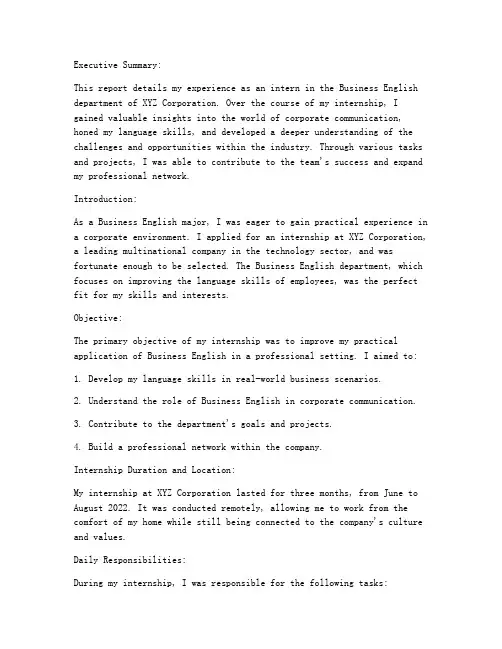
Executive Summary:This report details my experience as an intern in the Business English department of XYZ Corporation. Over the course of my internship, I gained valuable insights into the world of corporate communication, honed my language skills, and developed a deeper understanding of the challenges and opportunities within the industry. Through various tasks and projects, I was able to contribute to the team's success and expand my professional network.Introduction:As a Business English major, I was eager to gain practical experience in a corporate environment. I applied for an internship at XYZ Corporation, a leading multinational company in the technology sector, and was fortunate enough to be selected. The Business English department, which focuses on improving the language skills of employees, was the perfectfit for my skills and interests.Objective:The primary objective of my internship was to improve my practical application of Business English in a professional setting. I aimed to:1. Develop my language skills in real-world business scenarios.2. Understand the role of Business English in corporate communication.3. Contribute to the department's goals and projects.4. Build a professional network within the company.Internship Duration and Location:My internship at XYZ Corporation lasted for three months, from June to August 2022. It was conducted remotely, allowing me to work from the comfort of my home while still being connected to the company's culture and values.Daily Responsibilities:During my internship, I was responsible for the following tasks:1. Grammar and Vocabulary Improvement:- Conducting research on business-related topics and creating materials to help employees improve their grammar and vocabulary.- Developing interactive online resources, such as quizzes and exercises, to engage employees in learning.2. Writing and Editing:- Assisting in the creation and editing of business documents, such as reports, emails, and presentations.- Proofreading and correcting grammar, punctuation, and spelling errors in documents.3. Language Training:- Participating in virtual language training sessions, both as a facilitator and a participant.- Providing feedback and suggestions to improve language skills.4. Project Support:- Assisting with the development and implementation of language training programs for new employees.- Collaborating with other departments to ensure the effective communication of company policies and procedures.Achievements:1. Grammar and Vocabulary Improvement:- Developed a comprehensive grammar and vocabulary resource for employees, which received positive feedback from the team.- Created interactive online exercises that helped employees practice and reinforce their language skills.2. Writing and Editing:- Assisted in the creation of several business documents, ensuring clear and effective communication.- Corrected grammar, punctuation, and spelling errors in documents, improving their overall quality.3. Language Training:- Participated in virtual language training sessions, providing valuable feedback and suggestions to improve language skills.- Developed a training module on business communication, which was well-received by the participants.4. Project Support:- Assisted in the development of a language training program for new employees, ensuring a smooth onboarding process.- Collaborated with other departments to create a comprehensive guide on company policies and procedures, improving communication across the organization.Challenges:1. Language Barriers:- While I had a strong command of Business English, I occasionally faced challenges in understanding certain technical terms or industry-specific jargon.2. Time Management:- Balancing multiple tasks and deadlines was sometimes challenging, requiring me to prioritize and manage my time effectively.3. Remote Work:- Working remotely presented some challenges in terms of communication and collaboration, but I managed to overcome them through regular check-ins and effective use of technology.Reflections:This internship provided me with invaluable experience in the field of Business English. I learned a great deal about the importance of effective communication in the corporate world and how language skills can impact business success. I also gained valuable insights into the challenges and opportunities within the industry.The experience has not only improved my language skills but also helped me develop essential professional skills, such as teamwork, problem-solving, and time management. I am grateful for the opportunity to work with such a talented and supportive team at XYZ Corporation and look forward to applying the knowledge and skills I gained during my internship in my future career.Conclusion:In conclusion, my internship at XYZ Corporation's Business English department was a rewarding and enriching experience. It allowed me to apply my academic knowledge in a real-world setting, develop my professional skills, and contribute to the success of the company. I am confident that this experience will serve as a solid foundation for my future career in Business English and corporate communication.。
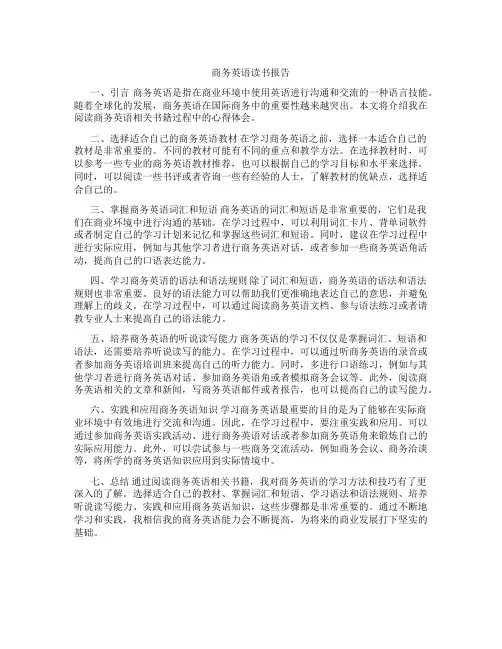
商务英语读书报告一、引言商务英语是指在商业环境中使用英语进行沟通和交流的一种语言技能。
随着全球化的发展,商务英语在国际商务中的重要性越来越突出。
本文将介绍我在阅读商务英语相关书籍过程中的心得体会。
二、选择适合自己的商务英语教材在学习商务英语之前,选择一本适合自己的教材是非常重要的。
不同的教材可能有不同的重点和教学方法。
在选择教材时,可以参考一些专业的商务英语教材推荐,也可以根据自己的学习目标和水平来选择。
同时,可以阅读一些书评或者咨询一些有经验的人士,了解教材的优缺点,选择适合自己的。
三、掌握商务英语词汇和短语商务英语的词汇和短语是非常重要的,它们是我们在商业环境中进行沟通的基础。
在学习过程中,可以利用词汇卡片、背单词软件或者制定自己的学习计划来记忆和掌握这些词汇和短语。
同时,建议在学习过程中进行实际应用,例如与其他学习者进行商务英语对话,或者参加一些商务英语角活动,提高自己的口语表达能力。
四、学习商务英语的语法和语法规则除了词汇和短语,商务英语的语法和语法规则也非常重要。
良好的语法能力可以帮助我们更准确地表达自己的意思,并避免理解上的歧义。
在学习过程中,可以通过阅读商务英语文档、参与语法练习或者请教专业人士来提高自己的语法能力。
五、培养商务英语的听说读写能力商务英语的学习不仅仅是掌握词汇、短语和语法,还需要培养听说读写的能力。
在学习过程中,可以通过听商务英语的录音或者参加商务英语培训班来提高自己的听力能力。
同时,多进行口语练习,例如与其他学习者进行商务英语对话、参加商务英语角或者模拟商务会议等。
此外,阅读商务英语相关的文章和新闻,写商务英语邮件或者报告,也可以提高自己的读写能力。
六、实践和应用商务英语知识学习商务英语最重要的目的是为了能够在实际商业环境中有效地进行交流和沟通。
因此,在学习过程中,要注重实践和应用。
可以通过参加商务英语实践活动、进行商务英语对话或者参加商务英语角来锻炼自己的实际应用能力。
商务英语报告Executive SummaryThe purpose of this report is to provide an overview of the current state of our company's international business operations, highlighting key performance indicators, market trends, and strategic initiatives for the upcoming fiscal year. This document is intended for internal use by senior management and stakeholders to inform decision-making and align efforts towards our corporate goals.Market AnalysisOur market analysis indicates a steady growth in the global market, with a particular uptick in the Asia-Pacific region. The demand for our products has increased by 15% in the last quarter, primarily driven by the technological advancements and the growing need for sustainable solutions. The competitive landscape remains dynamic, with new entrants posing challenges to our market share.Financial PerformanceOur financial performance has been robust, with a year-over-year increase of 20% in revenue. Profit margins have also improved, thanks to cost optimization strategies and the successful launch of high-margin products. However, we must remain vigilant about the fluctuating currency exchange ratesthat could impact our profitability.Operational EfficienciesOperational efficiencies have been achieved through the implementation of new technologies and process improvements. The adoption of an integrated enterprise resource planning (ERP) system has streamlined our supply chain, reducing lead times by 30%. Additionally, the investment in automation has increased production output by 25% without a proportional increase in labor costs.Strategic InitiativesLooking ahead, our strategic initiatives will focus on expanding our digital presence, enhancing customer experience, and exploring new market opportunities. We will invest in digital marketing to increase brand awareness and driveonline sales. Furthermore, we will launch a customer loyalty program to retain and grow our customer base.Risk ManagementRisk management will be a critical component of our strategy. We will continue to monitor and mitigate risks associated with geopolitical tensions, regulatory changes,and economic uncertainties. A comprehensive risk assessmentwill be conducted quarterly to ensure proactive risk management.ConclusionIn conclusion, our company is well-positioned for continued growth and success in the international business arena. With a clear understanding of the market dynamics, a strong financial foundation, and a commitment to operational excellence, we are confident in our ability to achieve our strategic objectives and deliver value to our shareholders.。
商务英语读书笔记在当今全球化的商业环境中,商务英语已经成为了沟通交流的重要工具。
为了提升自己在商务领域的英语能力,我阅读了相关的书籍,并做了详细的笔记。
以下是我对所读内容的一些整理和思考。
首先,商务英语中的词汇具有很强的专业性。
例如,“balance sheet”(资产负债表)、“profit margin”(利润率)、“market share”(市场份额)等词汇,在日常英语中并不常见,但在商务交流中却频繁使用。
掌握这些专业词汇是理解和表达商务信息的基础。
在阅读中,我还发现商务英语的语法和句式也有其特点。
为了使表达更加准确、清晰,常常会使用复杂的长句和被动语态。
比如,“The contract was signed by both parties after a series of negotiations”(经过一系列的谈判,合同由双方签署。
)这种表达方式更加正式和严谨。
商务英语的写作方面,格式和结构非常重要。
比如商务邮件,通常包括称呼、开头问候语、正文、结尾祝福语和署名等部分。
而且,正文中要先说明邮件的目的,然后提供详细的信息和解释,最后总结并提出期望的行动。
在商务英语的口语交流中,礼仪和文化的理解也至关重要。
不同国家和地区的商务文化存在差异,例如在某些国家,直接拒绝对方的提议可能被视为不礼貌,而需要采用更加委婉的方式。
书中还提到了商务英语在谈判中的应用。
在谈判前,需要做好充分的准备,了解对方的需求和底线,同时明确自己的目标。
谈判过程中,要善于倾听对方的观点,用恰当的语言表达自己的立场,并且灵活运用妥协和让步的策略。
另外,商务英语在会议中的运用也有很多技巧。
在会议中,清晰、简洁的表达自己的观点非常重要。
同时,要能够理解他人的发言,并及时做出回应。
掌握一些常用的会议用语,如“Let's move on to the next point”(让我们进入下一个要点。
)、“I'd like to summarize the main points”(我想总结一下主要要点。
关于商务英语的读书笔记最近读了几本关于商务英语的书,真是让我大开眼界,感觉像是打开了一个全新的世界。
以前我总觉得商务英语嘛,不就是在普通英语的基础上加点专业词汇,能写个邮件、做个报告就差不多了。
但深入了解之后才发现,这里面的门道可多了去了。
就拿商务英语中的沟通来说吧。
有一次,我看到书上提到一个案例,说是一家中国的小公司想要和一家国外的大企业合作。
中方这边派出了一个业务能力很强的团队去和对方谈判。
一开始,双方交流得还算顺畅,可当谈到一些关键的合作细节时,问题就来了。
中方代表在表达自己的观点时,用了很多委婉、含蓄的说法。
在咱们中国人的文化里,这可能是一种礼貌,一种给对方留面子的方式。
但老外那边可就懵了,他们根本不明白中方到底是什么意思,直说让中方直接点,有啥说啥。
这可把中方代表给急坏了,他们觉得已经说得很清楚了呀。
后来经过一番解释和调整,双方才终于弄明白彼此的意思。
你瞧,这就是文化差异在商务英语沟通中的体现。
要是不了解这些,很可能一个好好的合作机会就这么黄了。
还有商务英语中的邮件写作,那也是有讲究的。
比如说,开头的称呼就不能马虎。
如果对方是比较熟悉的合作伙伴,那可以用“Dear 名字”;要是不太熟悉或者是比较正式的场合,就得用“Dear Sir/Madam”。
然后呢,邮件的正文得简洁明了,重点突出。
可不能像咱们平时跟朋友聊天那样,东拉西扯一大通。
我记得有一次,我自己试着写了一封商务英语邮件。
当时觉得自己写得还不错,检查了好几遍才发出去。
结果等了好久都没收到回复,我还纳闷呢,难道是对方没看到?后来过了几天,对方终于回了,说我的邮件写得太啰嗦,他们看了半天都没找到重点。
哎呀,当时那个尴尬呀,我这脸都不知道往哪儿搁了。
再说说商务英语中的词汇吧,那可真是五花八门。
什么“m arket share”(市场份额)、“profit margin”(利润率)、“supply chain”(供应链)等等。
这些词看着简单,用起来可不容易。
商务英语精要读后感English:After reading "Business English Essentials," I've gained a profound understanding of how crucial effective communication is in the business world. The book's emphasis on clear and concise language, proper etiquette in written and verbal communication, and the importance of cultural sensitivity has broadened my perspective on professional interactions. Additionally, the sections on email etiquette, formal writing style, and effective presentations have equipped me with practical skills that I can apply directly in my career. I appreciate how the book integrates language skills with business contexts, making it a valuable resource for anyone looking to improve their communication abilities in a professional setting.中文翻译:阅读了《商务英语精要》,我对有效沟通在商业世界中的重要性有了深刻的理解。
该书强调清晰简洁的语言、书面和口头沟通中的正确礼仪,以及文化敏感性的重要性,这拓宽了我的专业交流视野。
商务英语专业书籍读后感800字After finishing reading the business English professional book, I have gained a deeper understanding of the importance of communication in the business world. 读完商务英语专业书籍后,我对商业世界中沟通的重要性有了更深入的了解。
Effective communication is the cornerstone of success in any business setting. It is essential for conveying ideas, building relationships, and achieving goals. 有效的沟通是任何商业环境中成功的基石。
它对于传达想法、建立关系和实现目标至关重要。
Moreover, the book also highlighted the significance of cross-cultural communication in today's globalized business environment. Understanding and respecting different cultural norms and practices can foster better collaboration and partnerships. 此外,该书还强调了在当今全球化的商业环境中跨文化沟通的重要性。
了解和尊重不同文化的规范和实践可以促进更好的合作和伙伴关系。
In addition to communication skills, the book also provided valuable insights on business etiquette, negotiation tactics, and professionalnetworking. These are essential tools for anyone looking to succeed in the competitive world of business. 除了沟通技巧,这本书还提供了有关商务礼仪、谈判策略和专业人脉网络的宝贵见解。
Reading Report of Commercial EnglishName of the book: Fate of Nations The book tells people what is the most important factors in a country’s development. According to the book, the fate of nations is mostly determined by its technology. In the past so many years, revolution of science and technology has brought great benefit to all the nations, especially those powerful countries such as America and Germany, which use the latest technologies and own the best basic facilities to develop them.The book analyses some of the main technique achievements in history. One of these achievements is a new mode of production, which is called the production line. It was first applied to production by Ford Motor Company. In this way, every part of a car is assembled in a flowing line, which is moving continuously. It was so efficient that the time to produce cars was greatly reduced. The workers simply watched the line so the company employed fewer workers and saved money. The T-type car is one of the most successful designs in history of cars. It is just produced by the production line and brings huge benefits to Ford. Ford is imitated by other companies and become famous throughout the world.Another invention is the roll film. George Eastman applied his invention to camera and made Kodak a household brand. With the slogan“you press the button, we do the rest”, George Eastman put the first simple camera into the hands of a world of consumers in 1888. In doing so, he made a cumbersome and complicated process easy to use and accessible to nearly everyone.These stories tell us that countries can’t ignore the development of its technology. Every world-famous company has its own core technology. Through invest in science needs a long period to take effects, it will provide us with core-competitiveness.We need a lot of work to pave the way to advanced technology. First, we need a better education system. The book compares the education method of some countries including China. The conclusion is that student should be encouraged to search the answer instead of recite the result in books. Second, patents should be better protected to encourage innovation. In a word, we need to do a lot to improve our system.New technology means new opportunity. Now we when we enjoy our smart phone, we should know that it is advanced technology that brings Apple Company a great success. The book also draws my attention to the competition of economy. Our country is still behind developed countries in science. We have to buy chips and Machine Tool with a high price from abroad. We cannot set our base on other’s supplication. With so many problems to solve, we still have a long way to go.。
Book Report on International Business NegotiationInternational Business Negotiation Theory Cases and Practices is a book written by Bai Yuan. It is a text book for international economy and trading of the 21st century and has been compiled to contribute to high qualified negotiation specialists, who will possess necessary knowledge in both negotiation theories and practices. The objective of the book is in complete accordance with the need of China’s requirement for high qualified personnel after its accession into WTO; therefore the book has been widely accepted by experts, professors and students. In 2006, the book was chosen into the list of the national textbooks for “the Eleventh Five Year Plan”.Introduction of the author:Bai Yuan, Assistant professor, advisor of postgraduates, now teaching in the Department of Foreign Trade and Economics in Beijing Second Institute of Foreign Languages (BSIFL). After graduation from English Department of BSIFL, she pursued M A degree in world economy in both New York University and International University of Japan. She worked as a special advisor with the national project office for World Bank project of rural water supply for 6 years and participated in quite a few complex negotiations on investment and trade.Introduction of the content of the book:The focus of the book is on negotiation theories and principles, case studies and practices rather than negotiation skills. The deliberation of the writer is to let students understand the general characteristics of a negotiation so that they will be able to deal with all kinds of negotiations no matter where, when and with whom they are talking with.The book has three components:1. Lectures: concentrating on motives, structure, basic theories and principles, personality styles and culture patterns.2. Case studies: to facilitate better understanding of lectures, both famous cases and cases happening in normal business activities provided for analysis, for example, Sino-US Intellectual Property Right Case, US-Japan Negotiation on Auto and Auto Parts, and cases based on writers’personal experiences. Also the book made studies on trust and cultural values, cost structure analysis and ways of achieving win-win result.3. Simulations: compiled in light of true stories to suit for class practices. Students can, after negotiating among themselves, compare their results and results actually happened and find out the discrepancy. Simulations and other purposely designed exercises aid learning of (1) different negotiation situations, (2)absorbing information and sizing up a situation quickly,(3) condensing and intensifying what happens in business and personal situations,(4) connecting theory with practice.My understanding of the bookThe book has developed a comprehensive knowledge system consisting of negotiation motives, procedure and structure, preparation, basic negotiation theories and principles, negotiators’psychological behavior and personality styles, negotiation categories, culture patters, exercises and cases. Through learning, we will be able to:1. Increase understanding the characteristics of a negotiation;A negotiation is a process of communication between parties to manage conflicts in order for them to come to an agreement, solve a problem or make arrangements. It is a basic means of getting what you want from others. James Wall believes that “business negotiation is a process through which two or more parties coordinate an exchange of goods or services and attempt to agree upon rate of exchange for them. ”(Ja mes Wall, 1985: 4) ;Ways Max defines negotiation as “a process in which two or more parties, who have both common interests and conflicting interests, put forth and discuss explicit proposals concerning specific terms of a possible agreement. ”(Ways Max, 1979: 15)2. Develop ability to analyze the process and structure of a negotiation;People negotiate due to the following motives: 1) to get the limited resources; 2) to fulfill the task both the party can’t do it on his own; 3) toreach an agreement when have different ideas.Structure of business negotiations consists of inquire, offer, counteroffer and acceptance.3. Increase awareness of attitudes, mind set and basic theories in different negotiation situations;Here are the major steps for negotiation: 1) determine interests and issues; 2) design and offer options; 3) introduce criteria to agreement; 4) estimate reservation points; 5) explore alternative to agreement; 6) reach an agreement.While the negotiation format steps including: 1) introduction of team members; 2) negotiation agenda and its arrangement; 3) formal negotiation; 4) wrapping up.4. Increase awareness of one’s psychological behavior and personality style as they are backed by one’s culture.If you are going to have a negotiation, you must make some preparations. a) Know what you want and don’t want; b) know what your counterpart wants and doesn’t wants; c) know what your concession you are willing to give; d) know your alternative options; e) know your counterpart and you subject matter; f) rehearse.The main concern of this book:1. Principled negotiation strategy1) try to see the situation from your opponent’s perspective; 2) don’tdeduce your opponent’s intentions from your fears; 3) avoid blaming your opponent for the problem; 4) discuss each other’s perception; 5) seek opportunities to act in consistently with your opponent’s misperceptions;6) give your opponent a stake in the outcome by making sure they participate in the negotiation process.2. Win-win modelWin-win model is to determine each party’s interests and needs, to find out the other party’s interests and demands, offer constructive options and solutions, announce success of negotiations, or declare failure of negotiations or negotiations in impasse.Win-win assertion is practically possible because every negotiator has his own priorities during negotiation. In other words, the priorities attached to the various issues that are presented by both sides will always be different because each gives something of less important for something of great importance, the bargaining process becomes possible and both sides can win. The win-win outcome is a function if the fact that the buyers’ and sellers’ agendas are different.To reach a successful negotiation, you also should enhance your negotiation power. You can provoke and stimulate the other party’s motivation by offering inducement, demonstrating attractiveness, getting external third party’s back and placing a time limit; or increase the other party’s dependence on itself and meanwhile reduce its own dependenceon the other (reducing, delaying or withholding services or resources; blocking the other party’s ability to work on their own; isolating the other party; convincing the other party to give up;) offer more substitutes.There are also other sources of negotiation such as the state of the market, market share, information, time, corporate size and structure, reputation and product life-cycle.Being used as teaching materials for undergraduates, postgraduates and trainees, the book revises repeatedly to fit the teaching purpose. The book is suitable for students majoring in subjects in international business, such as trade, economic cooperation, MBA, investment, finance, world economy, and international relation. Since its publication in 2002, the book has received high comments and been used as their textbooks by quite a lot of universities nationwide. We as students of business English major, the book is worth reading.字数:1200words。